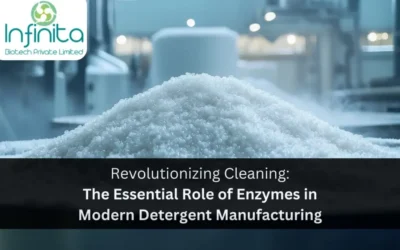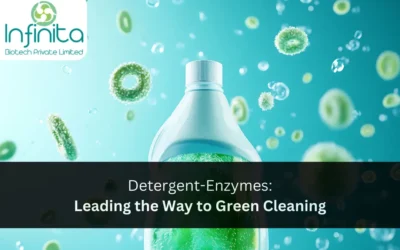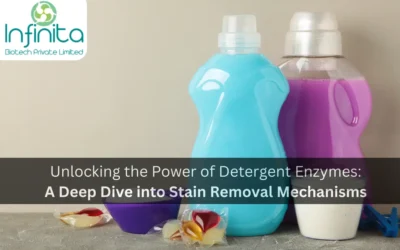Introduction
Enzymes have revolutionized the detergent industry by making cleaning products more effective, eco-friendly, and efficient. These biological catalysts break down tough stains, allowing detergents to work better at lower temperatures while reducing the need for harsh chemicals.
In this blog, we will explore how enzymes work in detergents, their key benefits, and their role in modern cleaning products.
How Do Enzymes Work in Detergents?
Enzymes function by breaking down specific types of stains into smaller, water-soluble molecules that can be easily washed away. Different enzymes target different stain types, enhancing the cleaning power of detergents.
Common Enzymes Used in Detergents:
- Proteases – Break down protein-based stains (blood, egg, grass, sweat)
- Amylases – Remove starch stains (pasta, gravy, sauces)
- Lipases – Dissolve fat and grease stains (butter, oil, makeup)
- Cellulases – Restore fabric brightness by breaking down tiny cotton fiber fuzz
- Mannanases & Pectinases – Tackle plant-based stains from sauces, fruits, and coffee
The Role of Enzymes in Detergent Products
1. Powerful Stain Removal
Enzymes target and break down tough stains, making detergents more effective even in cold water washes.
✅ Removes protein stains like sweat, blood, and dairy
✅ Cleans oily and greasy food stains effectively
✅ Eliminates starchy residues from food spills
2. Energy Efficiency & Cold-Water Washing
Unlike traditional detergents that require hot water for effectiveness, enzyme-based detergents work well in low-temperature washes.
✅ Reduces energy consumption and lowers electricity costs
✅ Extends fabric life by preventing heat damage
✅ Supports sustainable washing practices
3. Fabric Care & Color Protection
Certain enzymes, like cellulases, help maintain fabric integrity by gently removing micro-fibers that cause pilling and dullness.
✅ Keeps clothes looking brighter and newer
✅ Reduces pilling on cotton fabrics
✅ Protects delicate fibers from overuse of harsh chemicals
4. Environmentally Friendly Cleaning
Enzyme-based detergents reduce the need for phosphates and harsh surfactants, making them more biodegradable and eco-friendly.
✅ Less chemical waste in water systems
✅ Biodegradable components reduce pollution
✅ Helps promote sustainable household cleaning
5. Effective in Laundry & Dishwashing Detergents
Enzymes are used in both laundry and dishwashing detergents for superior cleaning performance.
✅ Laundry detergents – Remove stains, soften fabrics, and keep colors vibrant
✅ Dishwashing detergents – Break down food residues, grease, and starch deposits
Conclusion
Enzymes have transformed modern detergents by making them more effective, sustainable, and energy-efficient. Their ability to break down stains without damaging fabrics or requiring hot water makes them a game-changer in the cleaning industry.
As consumers shift toward eco-friendly and high-performance cleaning solutions, enzyme-based detergents continue to lead the way in innovation and sustainability.







